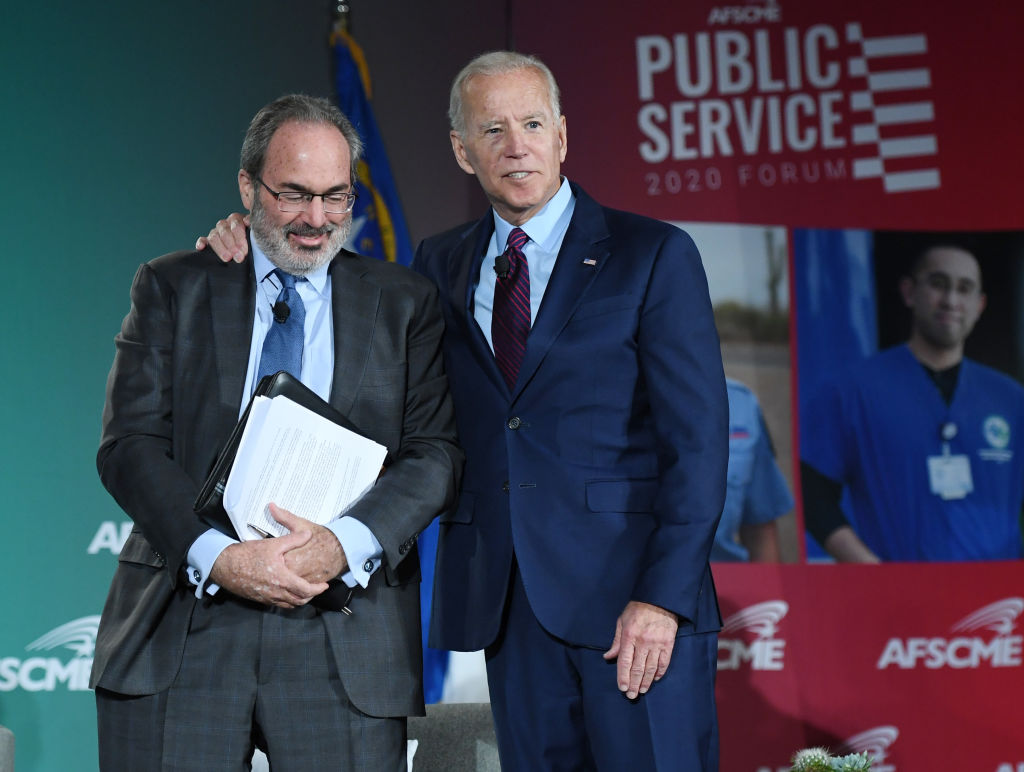“In 2016, Crazed Bernie Sanders Supporters Went on a Chair-Throwing Rampage in Nevada” and Other Blatant Lies Spread by the Mainstream Media
Remember when Bernie Sanders supporters went berserk and “threw chairs” at the 2016 Nevada Democratic convention? The widely reported incident never happened — but the originator of that myth will be co-moderating tonight’s debate.

Democratic presidential candidate Joe Biden puts his arm around moderator and Nevada Independent editor Jon Ralston as he tries to let Biden know he was running over his allotted time during the 2020 Public Service Forum on August 3, 2019 in Las Vegas, Nevada. Ethan Miller / Getty
The Nevada Democratic convention of May 2016 elicited several serious allegations of unfair, or at least highly questionable, conduct by party officials. But these were not the principal story to emerge from the proceedings, as an altogether different narrative took shape in the national media. Instead, reports of aggressive, even violent behavior from Bernie Sanders supporters dominated the airwaves, with outlets from the New York Times to MSNBC repeating a claim they had “thrown chairs” during the fractious event.
The origin of said claim was local journalist Jon Ralston, who, incidentally, will help co-host tonight’s televised debate in Las Vegas. Though widely reported by parts of the national media, the solitary source for the allegation that Sanders supporters had thrown chairs was a tweet from Ralston, which read as follows:
Convention ended w/security shutting it down, Bernie folks rushed stage, yelling obscenities, throwing chairs. Unity Now! On to Philly 2/2
Because Ralston had been live-tweeting the event throughout the day, the casual reader would easily have inferred he’d personally witnessed the incident. However, as Ralston later admitted, he had not actually seen anyone throw chairs. Instead, another local reporter claimed to have documentary evidence to this effect, which never actually appeared.
The fact-checking website Snopes.com has thoroughly debunked the chair-throwing claim, and NPR, which had initially run with it, changed the language in its reporting to concede it lacked any real evidence and that use of the word “violence” in relation to the events had been a mistake.
Despite this, Ralston has repeated the chair-throwing claim as recently as October 2018, and earlier this month, he derisively referred to “chair truthers.”
Far less widely reported are the many lingering questions about the conduct of the Nevada State Democratic Party in May 2016. In the immediate aftermath, Shadowproof cited no less than nine examples of questionable behavior from officials. According to a video posted by congressional candidate Dan Rolle (who was present at the convention):
An executive board of the Democratic Party in Nevada met and voted on a set of rules that allowed [chair] Roberta Lange to have “complete control over the convention.” It enabled the Party to ignore motions. It enabled the Party to exclude a disproportionate amount of Sanders delegates on the basis of not having “appropriate” registration information and limited the ability of any effort to challenge their authority. There were not enough people present to change the rules; however, the leadership held a voice vote and figured it did not matter. They proceeded as if the “yeas” had it, regardless of how loud the “nays” were.
As with so many Democratic Party micro-controversies, legitimate concerns about the fairness of the process were sidelined in favor of a partisan narrative aiming to discredit Sanders and his supporters. Though ultimately a minor footnote in any history of the 2016 primary contest, the bogus chair-throwing story is yet a further entry into the mound of evidence that some media figures adopt a posture of assuming the worst and asking questions later when it comes to the current front-runner for the Democratic nomination.
Could tonight’s debate be as bad as the absurd affair hosted by CNN last month? We’ll know soon enough.